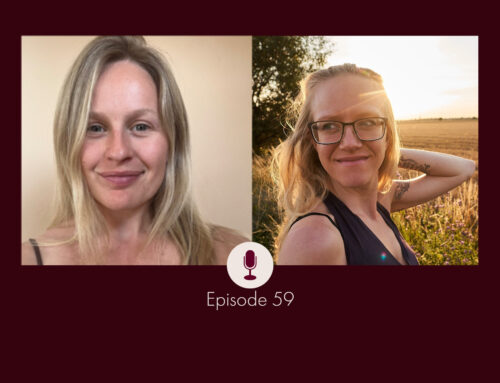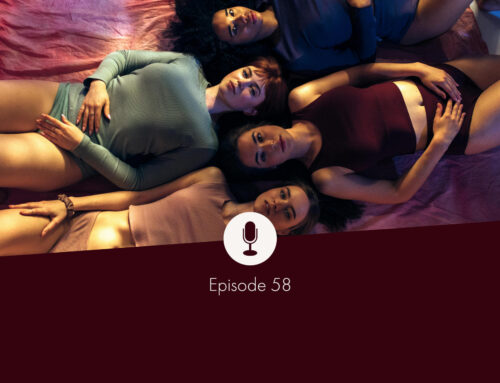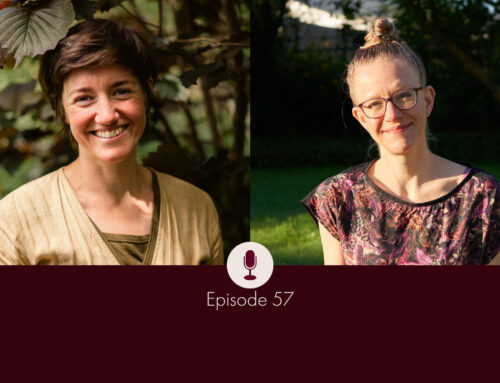[00:00:45] Hi and welcome. Today I wanted to share an observation with you that I’ve pondered on for a while. I’ve found it to be true for myself and when I shared that with a friend the other day, she was mind blown. So, I thought, who knows, maybe this is valuable and insightful for you, too.
[00:01:08] And that is the observation that I believe that we all have a natural season, regardless of whether it’s the inner season or displayed in the outer seasons, but that we have a season we feel most at home in, most comfortable in, most like ourselves in.
[00:01:31] And I just want to give a brief recap here: When I talk about the inner seasons, I mean that we all go through four different phases in our personal cycle, which is regardless of whether we menstruate or we cycle with the moon e.g., in post menopause or if we don’t have a cycle for any medical reason. And they are the inner winter, in menstruation or Dark Moon; the inner spring, between menstruation and ovulation or the waxing moon phase; the inner summer around ovulation or Full Moon; and the inner autumn, which is the premenstrual phase and the waning moon phase.
[00:02:29] And I just want to be clear here that I don’t mean to say that your cycle, if you have a menstrual cycle, should sync up with the moon, that you have to bleed at Dark Moon, for example. I don’t want to say that at all. I just give both references, of menstruation and Dark Moon, for example, because it’s either when you still bleed, then your inner winter is menstruation, and if you don’t bleed anymore for any reason, then Dark Moon is your inner winter. So it’s not about syncing them up or anything.
[00:03:08] And what I’ve observed is that this theme of what my natural season is, shows up in all areas of my life. So for me, I am an autumn and winter person. When it comes to autumn and winter, I feel creative, I get stuff done, I enjoy the time, I enjoy the cosiness of winter. I can be very productive even.
[00:03:38] But come spring, so let’s say February, when Nature is slowly starting to emerge again, I’m like “Oh my God, I need to hibernate now.” So for me, I have a hard time getting into the new year and getting into spring. And likewise, I experience that in my personal cycle. I am really productive and creative and full of energy after ovulation, in my inner autumn. And then when I get out of winter, out of menstruation, I have a really hard time “waking up” and getting back out there in the world after having rested in my personal menstruation time.
[00:04:31] And I do have that over a day as well, because a day follows the same four phases that the month or the year do. And I am a total night owl. You know, no matter how tired I am over the day, come roughly 8pm, I’m wide awake and I can go on doing stuff for hours. And I usually go to bed at around 1am, sometimes even later, which works really well for me. I’ve written my complete master’s thesis at 2am in the morning, because that was when I was awake.
[00:05:16] And I do have a hard time in the morning. Even when I get up at seven or six and I have slept for eight hours before that, I’m still super tired and my brain doesn’t want to work, even though I have slept enough hours. And no matter how tired I am over the day, for example, when I’ve had just a little bit of sleep, no matter how tired I feel over the day, come 8pm, I’m wide awake.
[00:05:47] And I find that I really love the synchronicity, that it all makes sense even in the seasons out there, even in my cycle, even during the day. That I’m structured like that. And I do have a friend who is the complete opposite. For her, when she comes into her inner spring and ovulation, that’s the best time for her. She loves the rise of the energy, she feels magnetic, she wants to express herself and be out there. But as soon as ovulation is over, she feels like she’s been hit by a truck. And for her, the premenstrual phase is really hard to bear, with severe mood swings and PMS symptoms. And likewise, once summer is over and it’s going towards November, she has real winter blues and can hardly cope.
[00:06:51] And again, I find that so interesting and of course we are all different, so my question to you: Ponder about what could your natural season be? Are you more of a winter person? Do you love the time of menstruation or Dark Moon – depending on whether you cycle with the blood or you cycle with the moon – is that your phase where you feel most connected to yourself and most yourself? Or is it spring, this emergence, out of menstruation or the waxing moon phase – is that where you feel full of energy and like you can take on the world? Or is it your inner summer, around ovulation or around Full Moon, where you feel most at home? Or is it, like for me, the autumn phase where you can get really productive and you feel super connected to yourself?
[00:07:49] I think it’s really interesting to have a think about that and then learn how to incorporate that into your life. I mean, I’m not a fan of having to plan your whole life around your cycle or anything, but knowing ourselves better through understanding what our natural season is, means that we can make some adjustments in our schedules or some adjustments simply in how we treat ourselves.
[00:08:26] Because, for example, for me, when I’m in that moment where everything feels hard and heavy and I have a hard time getting out there again, there are a lot of critical thoughts running through my head. And as much as I know that my brain is just trying to protect me by thinking these thoughts, they don’t help me, they don’t lift my mood, they don’t make me more productive or anything.
[00:08:57] But when I know that it’s typical for me to have these critical thoughts in that phase, I can go “Oh, I’m in that phase again. Okay. There’s nothing wrong. It’s not surprising. It’s okay. I can be compassionate. I can be gentle with myself.” And I know that as uncomfortable as it feels right now, there is going to be another time when things feel different without me having to do much about it.
[00:09:30] Because when we are in the middle of the mess, in the middle of the transition, it always feels horrible. But knowing that there is going to be another side, can help us speak to ourselves in a more soothing way, in a more loving way, and make the transition easier for us.
[00:09:51] Because let’s face it, as women and/or menstruators, we transition all the time. Our whole life is about transitions, because we transition from inner season to inner season roughly every seven days, if not less. There is no permanence. But knowing that there is a rhythm over the whole cycle, and that I will have times when I feel more energetic and times where I feel more inward and times where I feel more creative and times where I feel more reflective, then I can go easy on myself and not make myself wrong for it, because it’s a natural part of life.
[00:10:40] Connecting to ourselves like that brings more self-acceptance and it makes it easier to navigate these transitions. And we can start using our personal cycle and the transitions that we move through so often, as a practice ground, as a practice for when life really throws us a curve ball, or when life really happens and we have to make a bigger transition.
[00:11:20] And as women and menstruators, we go through these big transitions in life as well, like moving into our first bleed, moving into parenthood when we, for example, birth a child, when we cross over into menopause – we have to deal with transitions that can take months. And when we’ve practiced, when we know ourselves and we’ve practiced how to be with ourselves through these transitions, I believe it will be much easier to navigate these bigger life transitions as well.
[00:11:58] Yeah, so I’d love to hear from you, if you are willing to share with me: What is the season, your natural season, the season that you feel most at home in? And also, how do you know which one you feel most at home in? How do you feel? How are you? Do you feel connected? Do you feel most confident? Do you feel most creative? What does “feeling at home in a season” mean to you?
[00:12:29] I’m really looking forward to connecting on that and also to hear any other insights that you take from this episode and speak soon.
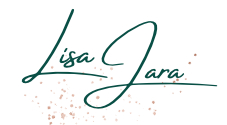



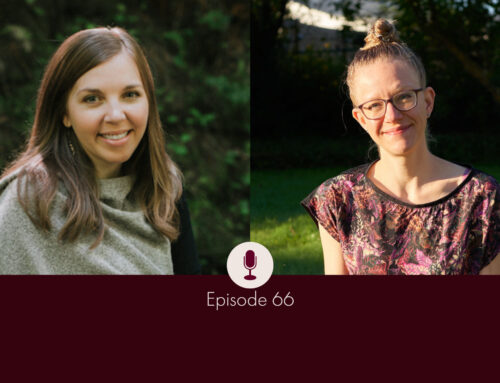
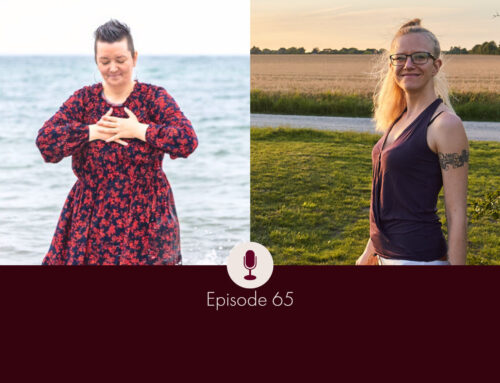
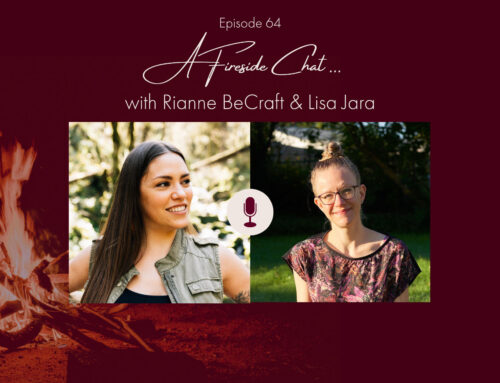
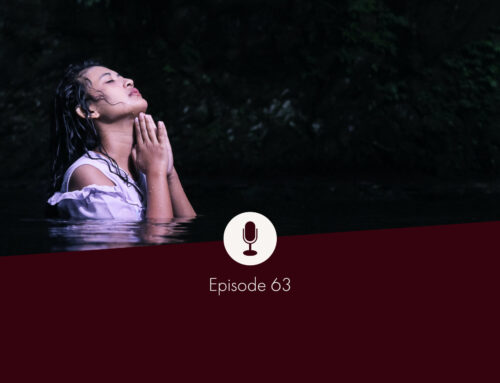
![Soothing the Inner Child to reduce Emotional Eating [Live Coaching]](https://lisa-jara.com/wp-content/uploads/2024/07/Womb-Whispers_Episode-60-Live-Coaching-Soothing-the-Inner-Child-to-reduce-Emotional-Eating_Beitrag-500x383.jpg)
